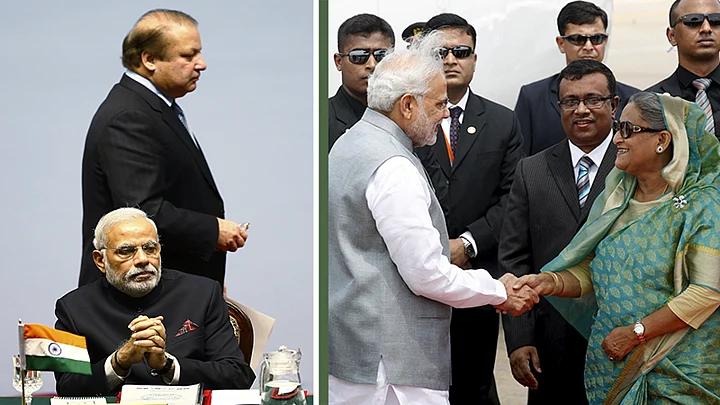Indian National Security Advisor Ajit Doval has rightly described Bangladesh as India’s “most important neighbour”. The bravehearts who fought and created Bangladesh buried Jinnah’s ‘Two Nation’ theory in the swampy battlefields in 1971 and proved that Islam and hate for India could not hold a country together.
By doing that, they exploded the Mountbatten model of the sub-continent and created possibilities of a new reordering based on India and neighbours friendly to it, even as Pakistan sinks further into the abyss.
Questions to ask of Pakistan
Pakistan Army chief General Raheel Sharif talks about Kashmir as the unfinished agenda of partition.
Like many Pakistanis, Sharif does not have an answer to a simple three-part question:
(i) If Bengali Muslims, who constituted more than 60% of undivided Pakistan’s population, could not get anything in Pakistan –
(ii) If the Awami League could not form a government after a clear majority in the 1970 polls –
(iii) If Mujib could not be the country’s prime minister after such a clear victory
– what can Pakistan offer to Kashmiris, whose population would remain in single digits even if the whole Srinagar valley were to join Pakistan?
So Bangladesh is the answer to Pakistan on Kashmir – if its army could massacre millions of Bengali co-religionists when they were only asking for a fair share of political power and economic autonomy, what can the Kashmiris expect?
The Geelanis must answer this very uncomfortable question.
Access to the Troubled Northeast
Secondly, India needs Bangladesh to easily access – and integrate – its troubled northeast.
The connectivity agreements signed during Narendra Modi’s visit to Dhaka will help. As travel time and expense for people and goods to the northeast from the Indian mainland comes down drastically because of transit through Bangladesh, the northeast region will come closer to what some call the ‘national mainstream’.
The surplus internet bandwidth Bangladesh is selling to India’s northeast through Agartala, for example, creates possibilities of an IT revolution in that far-flung region.
The Stepping Stone to Connecting with China
Thirdly, without Bangladesh, India’s “Look East” policy will never take off – one cannot imagine India connecting to south-east from the mainland through the 21-km Chicken’s Neck or Siliguri Corridor. India has to access its northeast better through Bangladesh before it aspires to connect to South-East Asia and China overland.
B’desh is Key to Modi’s South Asian Plans
Fourthly, Bangladesh holds the key to the success of regional cooperation in South Asia.
Since Pakistan is the eternal spoiler, Modi has done the right thing by talking SAARC but doing BBIN (Bangladesh-Bhutan-India-Nepal). The BBIN Motor Vehicles Agreement, that promises easy travel across the region, has taken off with Bangladesh support. The success of both BCIM and BIMSTEC critically depends on Bangladesh for a successful conclusion.
If Modi has to make his dream for a better integrated South Asia, he needs Bangladesh to hold up as the pivot.
Islam Not the Deciding Factor
Bangladesh is, as Lawrence Lifschultz said, burdened with an ‘unfinished revolution’. This is a Muslim majority country that prides itself on its Bengali heritage. It was created on Bengali secular nationalism, not Islam. Bengali Muslims do take their religion seriously but Bangladesh was not, unlike Pakistan, built on Islam.
Which is perhaps why it has a future. There are bigots in Bangladesh who kill for religion. But like the secular bloggers hacked to death in recent months, there are any number of liberal Muslims who are willing to fight and challenge them.
The secular bloggers kick-started the huge mass movement at Shahbagh Square, demanding a ban on religion-driven politics and seeking death for the 1971 ‘war criminals’ – the Jamaat-e-Islami activists who massacred their own people to keep Pakistan in one piece.
The overwhelming impact of the bloggers on the way young Bangladesh thinks has led the Islamist radicals to attack them brutally, so that their powerful voice is silenced. The radicals can never win the argument in Bangladesh – so they go for the sword.
Sheikh Hasina’s administration, praised by Modi for its ‘zero tolerance towards terror’ that prompted the huge crackdown on northeast Indian rebels, has taken the bold move to try the 1971 ‘war criminals’. Some have been hanged – others are waiting for the gallows. Many others are facing trial or have been served life imprisonment. Hasina has also cracked down hard and tough on a range of Islamist radicals, only to find some of them getting shelter in Mamata Banerji’s West Bengal.
Befriending a Neighbour to Make a Political Beeline
In Bangladesh, India has a neighbour to befriend and a case to make. The two neighbours not only share history and traditions but also have shared interests.
Bangladesh is India-locked, as Information Minister Hasanul Huq Inu rightly pointed out, and needs Indian support to grow. Modi touched quite an emotional chord in Dhaka by promising that “we will grow together” and “India will always back Bangladesh on the path of development”.
India needs Bangladesh to handle its northeast and make a success of regional cooperation minus Pakistan. And only if Bangladesh grows economically will the effect rub on neighbouring Indian states which are less developed than the rest of the country.
(Subir Bhaumik, a veteran BBC correspondent, is author of two highly acclaimed books on Northeast India –“Insurgent Crossfire” and “Troubled Periphery”.)
